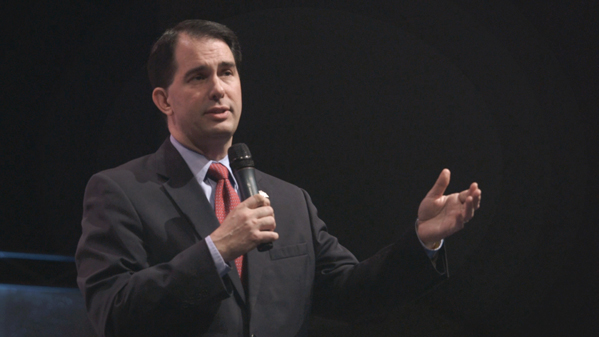In this shocking, depressing, blood-boiling documentary, filmmaker Steve Mims examines the shameless lengths to which conservative politicians and think tanks will go to ensure that business logic extends into every aspect of society, including higher education.
Through a litany of harebrained schemes, we see the uniquely American toxic mix of overreaching Republican governors (Rick Perry, Bobby Jindal, Scott Walker), organizations (the Heritage Foundation, the Cato Institute), pull-string congressmen (Marco Rubio), ethical egoists (Grover Norquist), and sycophantic administrators working feverishly to alter institutions that have functioned perfectly well for hundreds of years.
Thomas Jefferson founded the University of Virginia in 1819, and it was always intended as a bastion of liberal thought accessible to the general public. As educational government funding has been slashed with astonishing success, right wingers don’t realize they’re attacking the foundations laid out by the Founding Fathers they claim to revere. In a telling episode, the film covers the time when Wisconsin Gov. Scott Walker submitted a budget proposal that removed the words “search for truth” and “improve the human condition” from the University of Wisconsin-Madison’s mission statement, replacing them with “meet the state’s workforce needs” instead.
The first third covers the intricate, complex recent history at the University of Texas at Austin and Texas A&M. The debate was between slash-and-burn reformers and those who resisted running public institutions like businesses. This section is a bit of a whirl, with regents, administrators, chancellors, and the like flying at the viewer hard and fast. Perhaps a bit too fast; the result is overwhelming and hard to follow.
Mims set out to portray the debate as comprehensively and fairly as possible, and we get a real sense of how many players are involved and how many board meetings, reports, and resolutions are flying around. The central aim of the movement is especially clear, though, in Texas A&M’s infamous “red and black report,” which tallied how much money each professor brought into the university.
The film picks up steam as it moves to other major public institutions: the University of Virginia, the University of North Carolina, Louisiana State University, and the University of Wisconsin-Madison. Long serving, well-regarded presidents at UNC and UVA were ousted for not being entrepreneurial and “disruptive” enough. LSU, in particular, was nearly destroyed by zealous defunding, forcing its president to draft the equivalent of a bankruptcy plan.
Because there is so much information to be covered, and so many talking heads saying their piece, some of the malign effects of higher education defunding are glossed over. In his clear effort to be as fair and balanced as possible, Mims can’t go into detail about the huge increase in poorly paid, financially insecure adjunct professors, now teaching 74 percent of college classes. Coupled with skyrocketing tuition, defunding is giving students a worse education at a higher cost, which doesn’t exactly maximize efficiency, the primary idea driving the reforms.
The conservative reformers are just full of ideas, and Mims gives them wide breadth to explain them. In their zeal for finding innovative ways to creatively disrupt the doddering old public higher education space, the crusaders don’t realize that their ideas are not new at all. Take the most exotic of their ideas, the so-called “income share agreements,” whereby “undercapitalized” individual students, instead of taking out federal student loans, receive money from private investors to fund their college education. The only catch is that the student has to give the investor 15 percent of their salary for roughly 30 years after finding a job. Income share agreement advocates such as Marco Rubio argue that this is far more empowering and efficient than government loans. They don’t realize that this idea has been around for centuries, but it used to go by a different name: indentured servitude.
The focused zeal and organizational initiative displayed here is a testament to Bertrand Russell’s line that the whole problem with the world is that fools are so sure of themselves but wise people so full of doubt. These reformers are so focused on pushing through legislation and policies meant to systematically dismantle time-honored instruments of the public good that they apparently haven’t considered whether they should. Will overburdening students really help society in the long run? But when the world is a business, nothing is sacred, the self is all that exists, and society is an encumbrance.







Leave A Comment